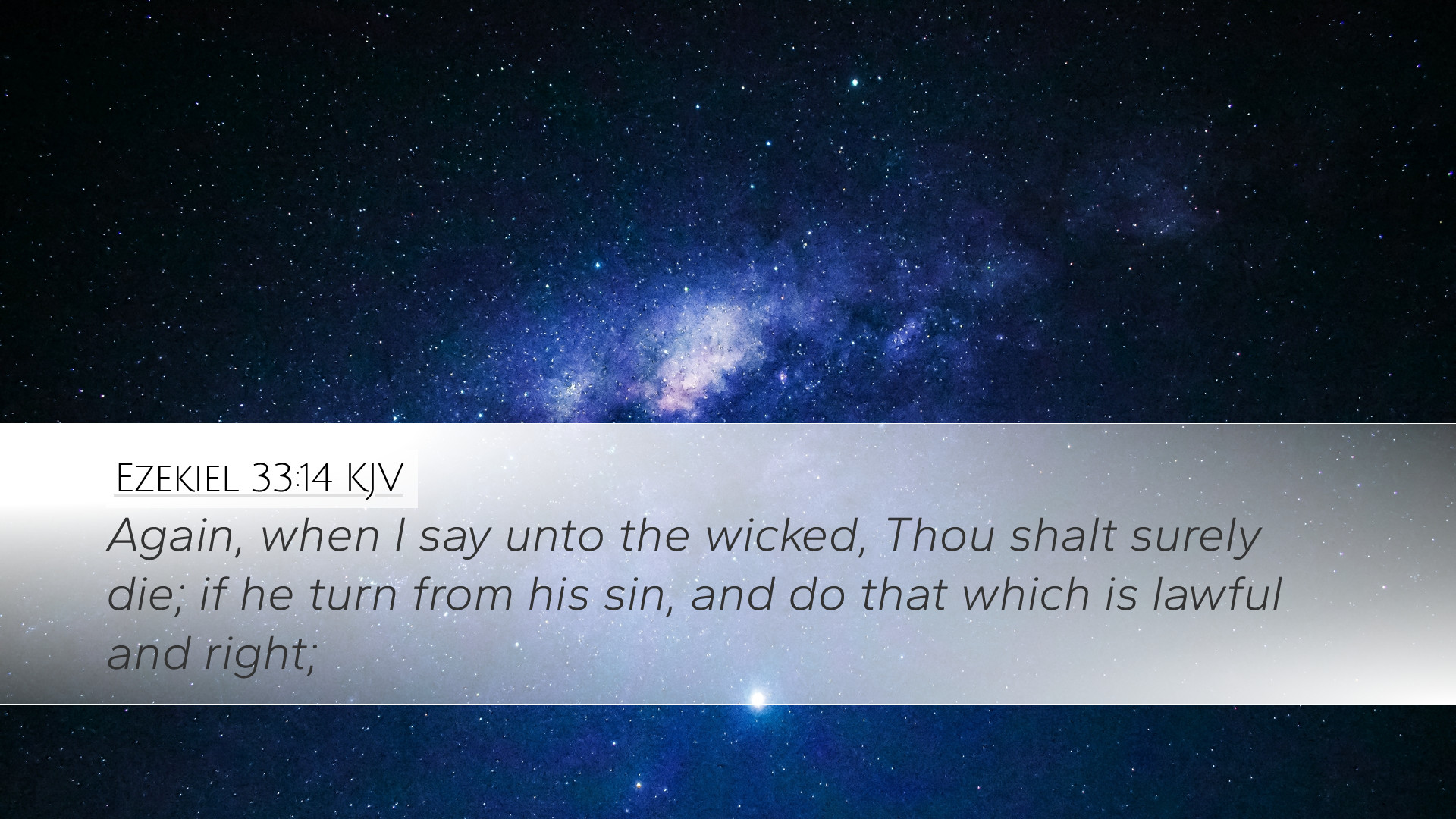Ezekiel 33:14 Commentary
Bible Verse: "Again, when I say unto the wicked, Thou shalt surely die; if he turn from his sin, and do that which is lawful and right."
Introduction
This verse from Ezekiel highlights the themes of repentance, divine justice, and the hope of forgiveness. The context of this passage is crucial as Ezekiel serves as a watchman for the house of Israel, tasked with warning sinners of their impending doom while also proclaiming the potential for redemption. The insights from various public domain commentaries enrich our understanding of the text.
Analysis of the Text
Divine Warning and Responsibility
Matthew Henry emphasizes the seriousness of God’s warning through Ezekiel. He notes that God, in His mercy, sends warnings to the wicked. This aligns with the nature of God as a just and loving deity, continuously inviting sinners to turn back from their ways and pursue righteousness.
The Role of the Watchman
Henry further discusses the role of the watchman, underscoring that it is not only a privilege but also a profound responsibility. When Ezekiel is commanded to declare warning to the wicked, he acts as a messenger of divine justice, tasked with the heavy burden of calling out sin while holding out the hope of redemption.
Conditionality of God's Judgement
Albert Barnes highlights the conditional nature of God’s judgment. The phrase "if he turn from his sin" reflects the principle of repentance as a prerequisite for receiving mercy. God is portrayed as just; He does not wish the death of the sinner, but rather that they would turn from their ways to live (Ezekiel 33:11). It emphasizes the need for personal accountability in response to divine instructions.
Repentance and Its Implications
Repentance as a Transformative Act
Adam Clarke points out that true repentance involves a turning away from sin towards righteousness. Clarke explains that this turning is not merely about feeling remorseful but about a definitive change in behavior and attitude. It embodies an active decision to pursue that which is lawful and right, as encouraged by the prophet.
The Nature of Sin and Righteousness
Henry portrays sin as a departure from God’s path, while righteousness is characterized by alignment with God’s laws. The call to do "that which is lawful and right" serves as a reminder that righteousness fulfills God’s commandments, affirming the necessity of obedience to ethical standards set by divine law.
Theological Implications
The Nature of God’s Justice
This passage invites theological reflection on God's nature. It demonstrates that God's justice is interwoven with His mercy. According to Barnes, God is not willing to punish without providing a means of escape through repentance. This reinforces the idea that divine justice is not only punitive but aims to rehabilitate the sinner.
Eschatological Perspectives
Additionally, Clarke reminds us that this text has eschatological significance. It hints at a broader truth regarding accountability before God and the eventual judgment of humanity. The repentance called for in this passage has implications not just for individual lives but for the community of faith as a whole.
Practical Application for Today’s Believers
Emphasis on Evangelism
This verse also has practical applications for modern believers. Pastors and church leaders can draw from this passage to emphasize the importance of evangelism and outreach. Just as Ezekiel was a watchman, so too are contemporary Christians called to alert others to the consequences of sin while offering the hope of redemption.
Encouragement in Personal Repentance
For individual believers, this scripture encourages self-examination and repentance. One must reflect on personal actions and seek to align with God’s will, acknowledging that change is both possible and expected when one turns to God sincerely.
Conclusion
Ezekiel 33:14 serves as a powerful reminder of God's dual nature as both judge and redeemer. The themes of warning, repentance, and hope challenge both the heart and mind of the believers today. The insights from Matthew Henry, Albert Barnes, and Adam Clarke combined provide a comprehensive understanding of this text that speaks to the gravity of sin, the hope for redemption, and God’s persistent call for righteousness.


